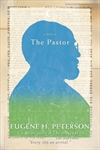 Eugene H. Peterson, The Pastor: A Memoir (New York: HarperOne, 2011). $25.99, 336 pages.
Eugene H. Peterson, The Pastor: A Memoir (New York: HarperOne, 2011). $25.99, 336 pages.
In The Pastor, Eugene H. Peterson tells “the story of my formation as a pastor and how the vocation of pastor formed me.” Peterson is best known as author of The Message, his “translation” of the Bible into “American words and metaphors and syntax.” He recently completed a five-volume series—“conversations”—about spiritual theology. And he has written numerous books about the pastoral vocation, the seedbed out of which all his other books has grown. This memoir narrates the journey of a Pentecostal kid from Montana becoming a Presbyterian pastor in Maryland.
For pastors, it is must-reading. For one thing, Peterson’s story shows how God uses the particularity of our circumstances to shape us into the people he wants us to be, under the tutelage of Holy Scripture. For another thing, it offers a searing critique of the commoditization of American religion that turns “each congregation into a market for religious consumers, an ecclesiastical business run along the lines of advertising techniques, organizational flow charts, and energized by impressive motivational rhetoric.” And finally, it does all this through a storytelling that alternates between humor, anger, frustration, and hope—the emotions all pastors face in their ministries.
Example: Peterson recounts being bullied by Garrison Johns in elementary school. Instructed by his mother to “turn the other cheek,” Peterson endured the insults and beatings until “[s]omething snapped within me.” He wrestled his tormentor to the ground, pinned him with his knees, and began pummeling him with his fists. His entreaties, “Say ‘uncle’” met with no response, so he began shouting, “Say, ‘I believe in Jesus Christ as my Lord and Savior.’” After a couple more hits, Johns said the words, gaining Peterson his first “convert.” How easily the “world” infects the “church” with disease-ridden modes of ministry!
Another example: Early in Peterson’s ministry, a local mental health institution invited him and other clergy to a two-year course in therapeutic technique. In the 1960s, when this took place, the pastoral counseling movement was gathering steam. Peterson learned much that was helpful from this instruction. But he also learned that counseling was not the pastor’s vocation. “The people who made up my congregation had plenty of problems and more than enough inadequacies, but congregation is not defined by its collective problems. Congregation is a company of people who are defined by their creation in the image of God, living souls, whether they know it or not. They are not problems to be fixed, but mysteries to be honored and revered.” That is the pastor’s task.
In Peterson’s telling, the pastor is “not someone who ‘gets things done’ but rather the person placed in the community to pay attention and call attention to ‘what is going on right now’ between men and women, with one another and with God—this kingdom of God that is primarily local, relentlessly personal, and prayerful ‘without ceasing.’”
Local, personal, and prayerful. For me, these three words summarize Peterson’s take on the pastoral vocation. Pastors lead congregations in a specific place. Montana is not Maryland. American is not Africa. Wise pastors understand the conditions of the place to which God has called them.
And they pay attention to the people among whom God has called them. Peterson quotes Baron Friedrich von Hügel, “there are no dittos in souls.” Pastors must minister to people in their individuality, attentive to their inherent contradictions. Like his Uncle Sven, who was adored by his little sister (Peterson’s mother), but abhorred by the wife he abused, and who killed him in self-defense: “When I finally did become a pastor, I was surprised at how thoroughly Sven had inoculated me against ‘one answer’ systems of spiritual care.” Souls are not dittos, and no ministry is one-size-fits-all.
But mostly, pastors pray, by which Peterson means that they enter an ongoing conversation with God characterized by listening and speaking to him. Early on, Peterson learned that “the vocation of pastor had to be understood entirely under the shaping influence of the biblical text,” which teaches the redemption of creation and calls for a response of worship.
Peterson’s memoir alternates between exasperation at what American churches so often are and hope at what they could be. He experienced both emotions in his ministry as a Presbyterian pastor in Maryland. But the dominant note of this personal narrative is hope. The church is “a colony of heaven in the country of death, a strategy of the Holy Spirit for giving witness to the already-inaugurated kingdom of God.” This definition is not theological boilerplate. Peterson learned it from “wise Christians, both dead and alive.” And though a Presbyterian, he shares the Pentecostal conviction that “everything, absolutely everything, in the scriptures is livable,” including a different way of being pastor and church in the world.
_____
P.S. If you found this review helpful, please vote “Yes” on my Amazon.com review page.

